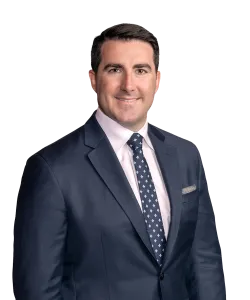Johnson & Johnson Challenges the Constitutionality of FCA $1.6 Billion Verdict
Headlines that Matter for Companies and Executives in Regulated Industries
Johnson & Johnson Challenges the Constitutionality of FCA $1.6 Billion Verdict
Following a record $1.6 billion jury verdict for off-label promotion of HIV drugs Prezista and Intelence, Johnson & Johnson (J&J) subsidiary Janssen Products LP appealed to the Third Circuit, mounting an expansive attack on the constitutionality of the False Claims Act (FCA) qui tam provisions. Supported by amicus briefs from the National Association of Manufacturers, US Chamber of Commerce, American Tort Reform Association, Washington Legal Foundation, Pharmaceutical Research and Manufacturers of America, and AdvaMed, J&J argued that deputizing private relators usurps executive authority vested exclusively in the president, violating separation-of-powers principles.
J&J also claimed the award’s massive statutory penalties — tripled damages plus per-claim fines on 160,000 Medicare and Medicaid submissions — constitute an excessive fine under the Eighth Amendment and punish protected commercial speech, implicating the First Amendment. J&J further contended the trial court’s jury instructions conflated lawful off-label prescribing with unlawful promotion, skewing liability.
The US Department of Justice (DOJ), which intervened to defend the statute, will file its brief in August. Whistleblowers Jessica Penelow and Christine Brancaccio, former Janssen sales representatives, will respond in September. The appeal follows renewed scrutiny of FCA qui tam authority after US Supreme Court justices voiced reservations in 2023’s Polansky decision. Additionally, a Florida district court invalidated qui tam suits in the Zafirov case, and Fifth Circuit Judge Kyle Duncan recently questioned their legitimacy.
The case is United States v. Janssen Prods., No. 25-1818 (3rd Cir. 2025).
District Court Dismisses FCA and Anti-Kickback Statute Suit for Failure to Allege Scienter
In a July 22 decision, the US District Court for the Western District of Pennsylvania dismissed, without prejudice, a qui tam complaint filed by former Sales Manager Chad Dietz alleging that Philips Respironics violated the FCA and various state analogs through unlawful kickbacks. Dietz claimed the company’s Patient Adherence Management Service — a comprehensive coaching program priced as low as $15 per enrollee — and free continuing-education courses were offered to durable medical equipment suppliers to induce purchases of CPAP machines reimbursed by Medicare and Medicaid, thereby violating the Anti-Kickback Statute.
Judge Christy Criswell Wiegand ruled that although Dietz described remuneration, he failed to plead the requisite scienter, that is, specific facts showing Philips knowingly and willfully offered unlawful inducements. The court held that conclusory assertions of “actual knowledge” and “reckless disregard” are insufficient under Federal Rules of Civil Procedure 8 and 9(b) . Dietz may amend his complaint by August 1.
The case is Dietz v. Philips Respironics, No. 2:21-CV-00272-CCW (W.D. Pa. July 22, 2025).
Illinois Man Sentenced for $3.6 Million COVID-19 Tax Fraud
Farooq Khan, a 31-year-old Chicago tax preparer and owner of Hannan Tax Services, was sentenced on July 22 to 42 months in federal prison and ordered to pay $3,645,104 in restitution after pleading guilty to one count of wire fraud. Between May 2020 and October 2021, Khan orchestrated a scheme to exploit the Paycheck Protection Program (PPP) and the Economic Injury Disaster Loan (EIDL) program, both created under the CARES Act, by preparing at least 30 fraudulent loan applications for non-operational shell companies. He inflated employee counts, falsified payroll records, and fabricated tax documents to secure the loans, personally diverting roughly $1.2 million while causing $3.6 million in total losses to the Small Business Administration and PPP lenders. Khan also attempted to secure an additional $588,900 in EIDL funds that were never disbursed.
The investigation was led by the Federal Bureau of Investigation’s Chicago Field Office and US Immigration and Customs Enforcement’s Homeland Security Investigations, and the case was prosecuted by the Fraud Section of the DOJ’s Criminal Division.
Read the DOJ’s press release here.
Importers to Pay $6.8 Million for Customs Fraud Violations
On July 23, Global Plastics LLC of Manchester, New Hampshire, and Marco Polo International LLC of Melville, New York, both subsidiaries of MGI International LLC, agreed to pay $6.8 million to settle FCA liability for underpaying customs duties on plastic resin imported from the People’s Republic of China. Beginning in May 2019, the companies misdeclared both the country of origin and the value of certain entries, reducing duty payments owed to the US Customs and Border Protection. After discovering potential violations, MGI voluntarily self-disclosed the misconduct in 2024, conducted an internal investigation, preserved and produced relevant evidence, quantified the damages, disciplined responsible employees, and enhanced compliance controls.
In recognition of these remedial steps, the DOJ awarded cooperation credit under its FCA guidelines, reducing the financial penalty. In a press release, Assistant Attorney General Brett A. Shumate emphasized that importers who evade duties obtain an unfair trade advantage but can mitigate consequences through timely disclosure and full cooperation. The settlement resolves allegations without an admission of liability.
Read the DOJ’s press release here.
Florida Woman Sentenced for Nearly $1 Million Student Aid Fraud
Reina Isom, 47, of Gainesville, Florida, was sentenced on July 15 to 30 months in federal prison and ordered to pay $348,148 in restitution after pleading guilty to wire fraud and two counts of federal financial aid fraud. From 2018 through 2023, Isom masterminded a scheme to steal approximately $930,000 in student aid by enrolling fictitious students — often using accomplices’ identities — in low-tuition online colleges. She filed over 50 fraudulent Free Applications for Federal Student Aid with the US Department of Education, intentionally omitting income information to inflate grant and loan awards. To keep the sham students eligible, Isom fabricated coursework, recycled assignments, and even submitted video speeches recorded by her husband under another person’s name. More than $340,000 of the disbursed aid flowed directly into accounts she controlled.
Southern District of Indiana Judge Jane Magnus-Stinson imposed the sentence, noting Isom’s extensive fraud history — including prior convictions for student-loan fraud in 2011 and arson insurance fraud in 2004 — and the need to deter repeat offenses.
Read the DOJ’s press release here.
Contacts
- Related Industries
- Related Practices







